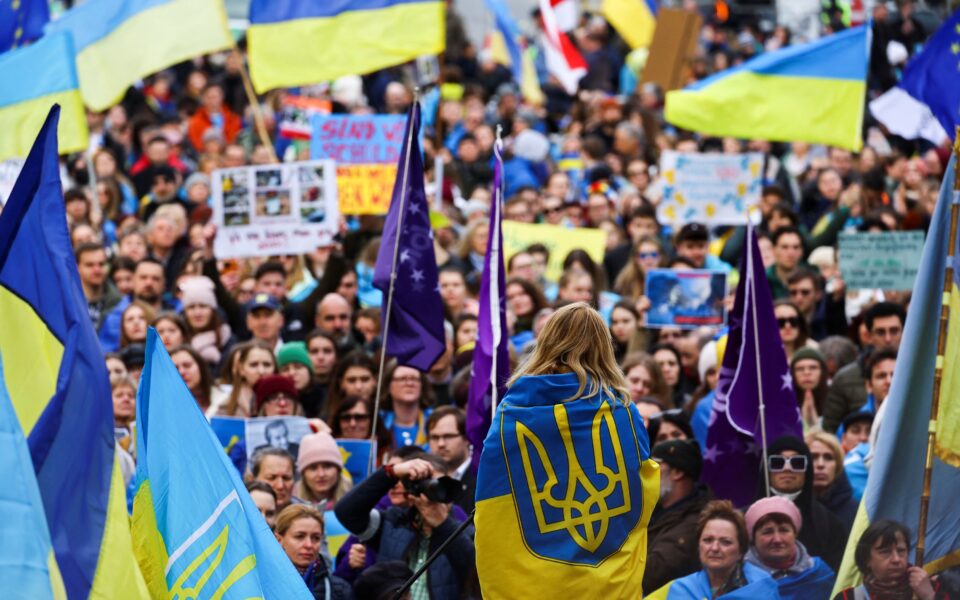Two years after Russian invasion, Greece struggles with ‘Ukraine fatigue’

On a bleak anniversary for Europe, the day that marks two years since the Russian invasion on Ukrainian soil, crowds of Greek supporters of Ukraine’s fight for freedom gathered in the city centers of Athens and Thessaloniki, expressing their continuous support and solidarity for the Ukrainian cause.
“We are proud to stand with today’s demonstrations – somebody has to,” Nicos Rompapas, the Executive Director of the Center for Liberal Studies (KEFiM) which supports the solidarity marches, tells Kathimerini English Edition. “For our organization and for me personally, the battle that Ukraine is fighting is a classic example of a country defending its national independence and freedom in the face of an unprovoked invasion” he says, before adding: “What is more, the invader is one of the greatest enemies of liberal democracy and a destabilizing force for the world, including for Greece and our region.”
As Russia’s brutal war on Ukraine is entering its third year, the situation on the battlefield is particularly crucial – even though the developments on the warfront no longer seem to be featured on the Greek media with the once consistent frequency.
Over the past few weeks, Kyiv has issued repeated warnings that its troops are under increased pressure and its resources and ammunition scarcer than ever before. Just two weeks ago, the country’s forces were forced to withdraw from the city of Avdiika to avoid suffering major losses, signaling the first major territorial grab for Russia in months. The war is now at a prolonged stalemate, a situation which favors Putin unless support for Ukraine’s overstretched military stays consistent.
Meanwhile, another battle is raging away from Ukrainian territory – one for the hearts and minds of the people of Europe. A risk is lurking around the EU as well as in Greece, one that analysts have dubbed “conflict fatigue” and which refers to a sense of disengagement with the war in Ukraine which, if left unchecked, “can erode public support and lead to increasingly loud and frequent calls for reduced military and financial support for Ukraine.”
Evidence suggests that the risk is especially high in Greece. A recent poll commissioned by the European Council of Foreign Relations across 12 European countries showed that, amidst a generally pessimistic outlook about the war’s prospects, Greece had the second highest percentage of people expecting a Russian victory, just after Hungary, with as many as 30% of respondents picking it as the most likely scenario. When asked what course they want their governments to take on Ukraine, Greece joined four other countries in expressing a desire to push Kyiv to accept a settlement, with a majority of 59% supporting that option, compared to merely 16% that expressed a willingness to support Ukraine in fighting back for its occupied territories.
For Rompapas, the low levels of public interest and support are partly due to Greece’s traditionally high opinion of Russia, a relationship which dates back before the Greek revolution and a connection emboldened due to Orthodoxy ties. “But we must not forget that the Kremlin has also penetrated the Greek media, particularly regional outlets where there is a strong presence,” he adds, concluding that it is a combination of all these variables that may make the Greek society feel less implicated by the conflict, “compared to countries formerly in the Eastern Bloc who have experienced Russian aggression firsthand.”
Olga Shapolayeva, an ethnically Greek interpreter and translator from Ukraine’s Mariupol, finds Greece’s stance disappointing and paradoxical given the strong presence of a Greek minority in Eastern Ukraine and the appalling atrocities committed by Kremlin’s forces in their towns.
“I don’t know what else we could do to raise awareness and solidarity,” she says in a tone of despair. “Leaving the military conflict aside, there have been countless indiscriminate attacks on hospitals, schools and apartment buildings, and so many cities razed beyond reconstruction. If after two years of mass slaughter someone is not sensitized, I can’t see what could change their mind in the immediate future.”
Shapolayeva is particularly disappointed by the loss of media interest in Mariupol, where she thinks Russian disinformation campaigns have been left to flourish. “We see propagandists from Moscow going there in bizarre ways, making false reports that paint a rosy picture that later appear on events organized by the Russian embassy or are picked up by the Russian media”, she adds. “The media’s interest has been lost, even though Mariupol is the cradle of Hellenism in Ukraine and home to one of the largest diasporas of Greeks in the world. Despite countless civilian deaths, it has been forgotten.”
For Iliya Paraskevopoulos, a young Greek who has been very vocal about the Ukrainian cause since the start of the war, supporting Ukraine is a matter of principle for Greece’s younger generation. “We belong to the Erasmus generation,” he says, “we didn’t grow up to simply become naive and happy, but also to safeguard the institutions of our state against ideologies seeking death and destruction. Today the international system that we, the Allied peoples of WWII created is being called into question. What totalitarianism cannot stand is exactly the moving sentiment the European Union evokes to young Ukrainians, the promise of democracy and institutions,” he adds.
Iliya continues to rally support for Ukraine on an almost daily basis, and he remains concerned with the attitude Greek society holds towards a people “who are willing to sacrifice lives for inclusion in our Union.
“To wonder if there is ‘fatigue’ in Greece from too much help for the Ukrainians does not honor us, and the fact that the war isn’t discussed in Greece should really concern us,” he concludes. “After all, we also have to deal with a similar imperialist mindset in our easternmost borders, so it is imperative that we prioritize our values correctly.”





